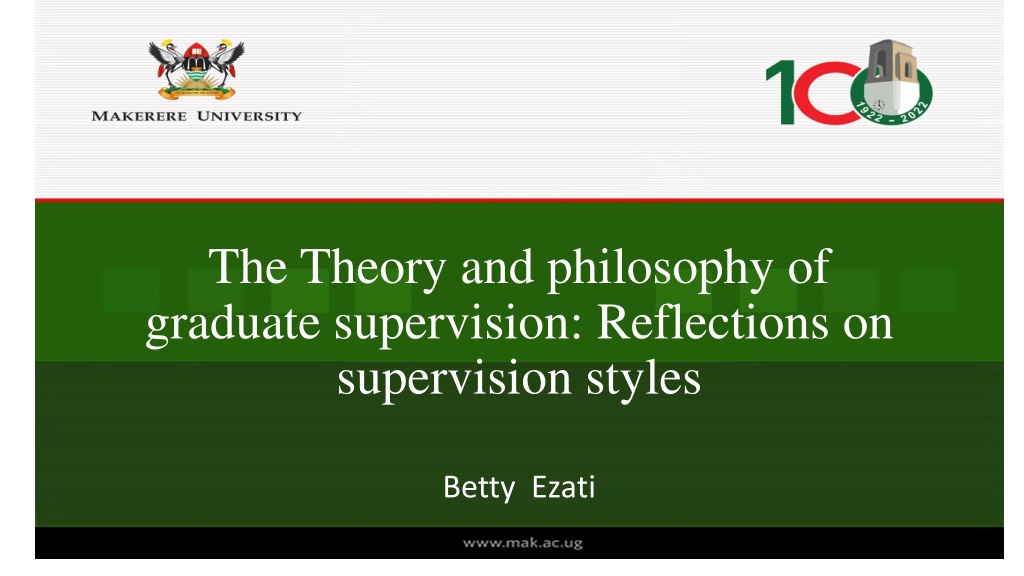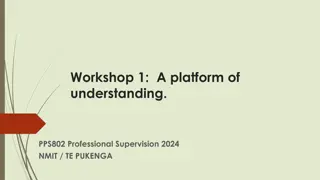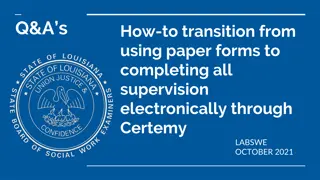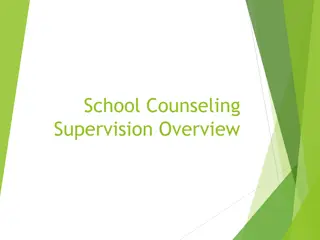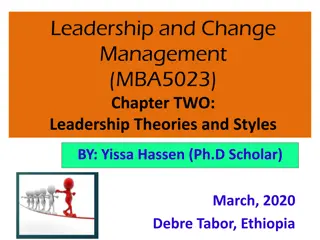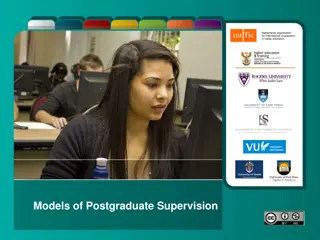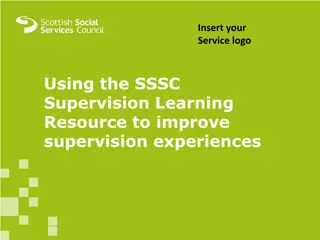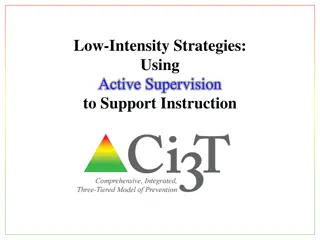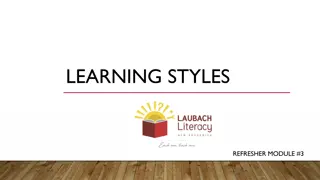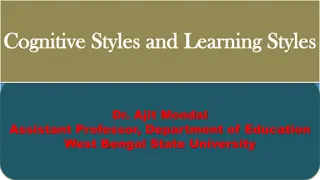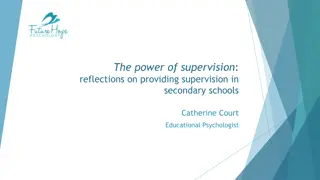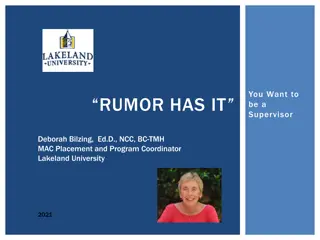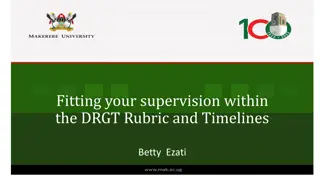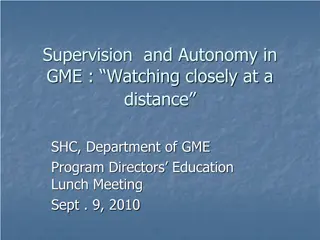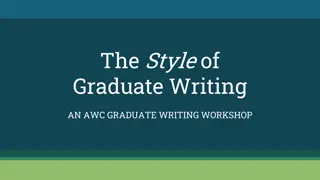Reflections on Graduate Supervision Styles
Graduate supervision involves a formal process where supervisors guide candidates to acquire professional behavior and competence. The relationship between supervisor and supervisee shapes the supervision style, influenced by personal experiences and capabilities. Various theoretical perspectives, such as classical academic and peer-to-peer approaches, impact the supervisory relationship dynamics.
Download Presentation

Please find below an Image/Link to download the presentation.
The content on the website is provided AS IS for your information and personal use only. It may not be sold, licensed, or shared on other websites without obtaining consent from the author. Download presentation by click this link. If you encounter any issues during the download, it is possible that the publisher has removed the file from their server.
E N D
Presentation Transcript
The Theory and philosophy of graduate supervision: Reflections on supervision styles Betty Ezati
Introduction Supervision Supervisors personal and professional experiences impact and shape supervisory relationships. Should you impose your values on students? A demanding practices that is hardly standardized Supervision style is known during supervision Supervision mainly one to one relationship Approaches Approaches used relies on supervisors capabilities derived from experiences and personality (Amundsen and McAlpine, 2009; B gelund, 2015) Relationship Defined by the learning role of PhD candidates and the teaching role of professors.
What is supervision? A formal process based on the relationship between supervisor and supervisee (candidate), where the supervisor s role is to help the supervisee acquire appropriate professional behaviour and competence in professional activities (Loganbill & Hardy (1983) Is discipline and oversight of work (Lee, 2009) Is a two-way interactional process that requires the student and the supervisor to connect intentionally with each other and within the spirit of professionalism, respect, collegiality, and open-mindedness (Ismail, Abiddin & Hassan, 2011). How do you perceive supervision?
Some theoretical perspectives 1 2 3 Classical academic Supervision as an issue of teaching Psychological Supervision as an issue of individual talent Socialisation Creating a working environment of togetherness 4 5 6 Master Apprentice Learning as best practice , copying and role modelling Neoliberal Focus on quality, publications, citations and time frames Peer to Peer Collegial and mutual learning 5
Psychological Supervision is a question of talent or style Supervisors prefer to learn more about themselves models and techniques how to conduct supervision to be able to stimulate the PhD student
Supervision as an issue of socialisation Collective research culture stimulates ability to cooperate Includes necessity for social integration favours those whose values are consistent with the dominant paradigm in the group regular meetings encouraging collaboration instead of competition the PhD students writing together
Master-Apprenticeship model Learning by best practice ( Community of Practice ) developing skills, values education towards independence Critics Tendency of unreflective imitation unequal relation works best with supervisor and students of similar background variables (Lee & Williams, 1999) master slave (Grant, 2008) It s a hierarchical relationship that provides an unidirectional mode of knowledge transfer from the powerful supervisors to powerless supervisees.
Peer to Peer model Dynamic situation of negotiations about the research process than the production of research Peer to peer Mutual learning processes PhD students and supervisors learn from one another PhD students and supervisors work/conduct research together
Neoliberal Efficiency, quality, evaluation, follow-up routines Market driven the production of PhDs (quantitative aspect) to publish (quantitative aspect) prestigious Journals (qualitative aspect) to recruit capable students timely completions apply for and get research funding appear as excellent (individual/environment) defined by other actors/institutions constructing oneself by participating in conferences, lists of publications, websites to become recruited as a supervisor for further career steps
Supportive Vs Directive (Gu, etal 2017) Personal support, (caring for wellbeing, fostering friendship, emotional, boosting confidence) Learner centered (Discovery dialogue and inquiry) 04 01 Purpose is to develop individual potential Promote deep learning 05 Academic support (availability, provision of timely feedback)) 02 Autonomy support (recognizing student s viewpoint, encouraging them to express their thoughts openly, and giving them the opportunity to make their own decisions) task-oriented aiming at providing framework for decision-making and action that is in line with the supervisor s vision (Somech, 2016) 06 03
Another way of viewing styles 01 Expert guide 06 Quality controller 02 Delegator Friend 05 03 Co-writer 04 Coach
Dynamics of supervision style Start: If there is no prior contact often starts in a business like fashion, directed at process Data collection By the time of data collection (in case of frequent contact of joint lab work/field work), a more personal style develops (if things don t go wrong). After the fieldwork Style of supervision often shifts back to a more businesslike approach, guiding the PhD candidate in the appropriate data analysis
Dynamics of supervision style Thesis writing: Relationship becomes more personal again, gradually shifting from a process approach to product supervision Final write up: As one approaches accepting the PhD manuscript, the relationship has to become more formal again, culminating in the official defence ceremony After the formal defence A more personal style, and the relationship often shifts back from product to a joint process of getting journal articles accepted, or of making policy briefs, conferences papers. If the process goes well, a good personal relationship remains, and the supervisory task shifts to career advice.
Concluding remarks (Tian & Singhasiri, 2016; Waghid, 2015), Supervisor is the closest person who can mentor and provide the support and guidance to the student Supervision is a personal journey of discovery. A relational and empowering process supervision is pedagogically a complex activity that is getting more controlled (regulations) (McGloin, 2018; Olmos-L pez & Sunderland 2017). Supervision is a mixed of roles and practices. You never use one style
The student-supervisor relationship is embodied in power dynamics, and its complex nature is influenced by various socio-economic factors such as culture, gender, ethnicity, expertise, age and race (Green & Dekkers, 2010). Note
What supervision style would you use?
THANK YOU FOR LISTENING THANK YOU FOR LISTENING
